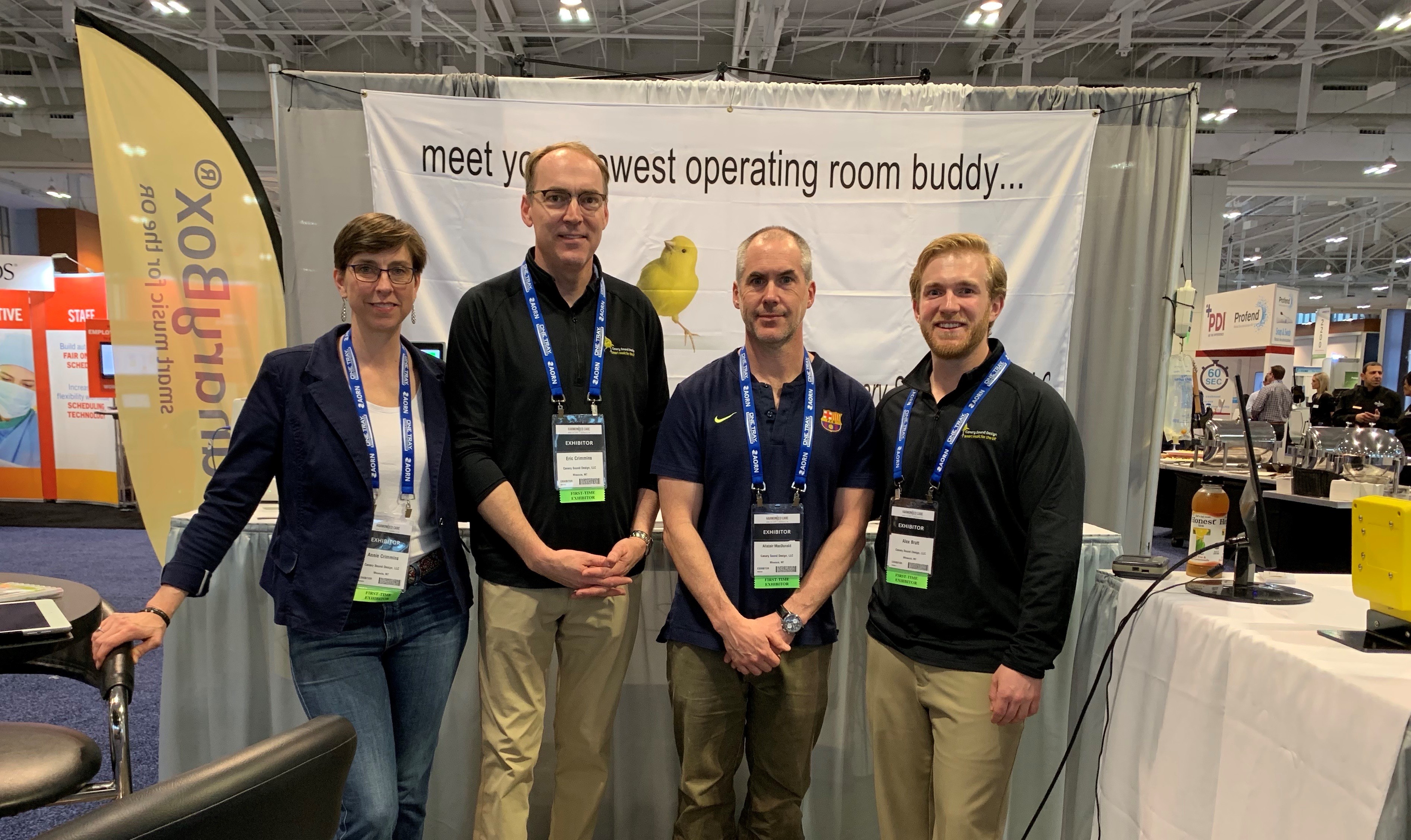
A small team of medical practitioners is bringing safety to sound in operating rooms.
Canary Sound Design, a Lincoln-based company, is the creator of CanaryBox, a smart music solution for the OR that is designed to reduce or silence music at appropriate times based on certain signals from the patient.
Canary Sound Design Founder and CEO, Alistair MacDonald, MD, has practiced anesthesiology for 20 years. He completed his residency at the University of Washington in 1999, and practices anesthesiology in Missoula, Montana. He and Eric Crimmins, MD, co-founded Canary Sound Design in 2018.
Dr. Crimmins earned his medical degree from the University of Nebraska Medical Center and completed his anesthesiology residency at the University of Washington. He has been practicing anesthesiology for 20 years and specializing in cardiothoracic and vascular anesthesia for the last 15 years. He is the company’s Chief Clinical Officer.
Annie Crimmins has a background in critical care nursing, and she is the company’s Chief Operating Officer. She graduated from Alfred University and practiced in the Harborview Medical Center Intensive Care Unit in Seattle, WA before applying her talents to organizational operations.

Dr. MacDonald was inspired to found Canary Sound Design and create CanaryBox as a result of an experience in one of his OR cases. A surgical patient began to deteriorate during the procedure. Dr. MacDonald had to shout above the music to draw attention to the situation. A nurse helped him stabilize the patient’s airway while the music continued playing. A nurse thereafter silenced the music. Fortunately, the patient recovered.
Dr. MacDonald had heard of a tragic and unrelated case in which a young, healthy teenage patient suffered anoxic brain injury due to missed ventilator alarms that were muted by OR music. The patient in that case did not survive.
Cases such as these caused Dr. MacDonald to wonder about the prevalence of the problem of music volume control in the OR, particularly as it relates the practice of anesthesiology. The critical nature of his job and his market research confirmed for him the need to develop a solution that would provide music sound control for improved patient safety in the surgical setting. He and his team set out to build a solution and created CanaryBox to provide intelligent sound in the OR.
Annie Crimmins noted that the beginning and end of surgical procedures are some of the anesthesia providers’ most critical moments for patient monitoring. The anesthesia team must maintain acute awareness of the patient’s vitals; these include respiratory rate and depth, oxygen saturation, heart and pulse rates, arterial blood pressure and temperature, and others. These vital signs can fluctuate and must be carefully managed as anesthesiology sedates the patient (induction), during the case, and at the conclusion of the case when the patient is aroused from sedation (emergence).

Annie shared that her team is often asked why music is used in the OR. She explained that music is an integral element of surgery, and studies have demonstrated that music reduces surgeon stress, helps improve focus, and can help a patient relax at the beginning of the case. However, she added, ORs can become an ‘acoustic nightmare’ with monitors, clinical alarms, loud medical equipment and instrument noises, and muffled relevant conversation behind surgical masks, for example.
The Environmental Protection Agency’s (EPA) recommended level for continuous back noise in hospitals is 45 decibels (dB). A study found that average noise levels in OR trauma procedures can reach 130dB.1
CanaryBox is intended to significantly reduce the distraction hazards created by music that could potentially mask an impending emergency. The CanaryBox music volume controller interfaces with most standard anesthesia monitors. The CanaryBox has default settings, though the anesthesiologist (or certified registered nurse anesthetist (CRNA)) can set pre-defined patient parameters as needed, such as in the case of pediatric patients, for example.
CanaryBox will reduce music volume or silence it completely under certain conditions, according to the CanaryBox settings. If a patient’s oxygen saturation drops to 90%, for example, the music volume will lower to 50%; the music will turn off completely if the patient’s oxygen saturation falls below 85%. The reduction in volume or silence is intended to draw the OR care team’s attention to the patient’s vitals and the monitor’s associated alarms, so that the team can focus on providing appropriate patient care without distraction.
CanaryBox set-up time is less than a minute for the first case of the day, and the device has a ‘suspend mode’ during case turnover. CanaryBox is hardwired and does not require Internet service, so integration in the OR’s EMR is not needed. The company is working to develop built-in Bluetooth functionality for the next CanaryBox iteration.

Canary Sound Design applied and was accepted as one of five companies to participate in the NMotion Accelerator in Lincoln and presented its pitch at the NMotin Demo Day on May 23. The company is set to present to 40 medical-based companies at the OnRamp Healthcare Conference on June 19 at Lambo Field in Green Bay, Wisconsin.
The company is running pilots in Missoula, Montana, Bend, Oregon and in Lincoln, Nebraska, and is seeking other early-adopters to test CanaryBox.
CanaryBox was mentioned in #99percentinvisible. Visit https://99percentinvisible.org/episode/sound-and-health-hospitals/ to listen.
Visit www.canarysounddesign.com to learn more about this company.
- https://www.jointcommission.org/assets/1/23/Quick_Safety_Issue_35_2017_Noise_in_OR_FINAL.pdf




